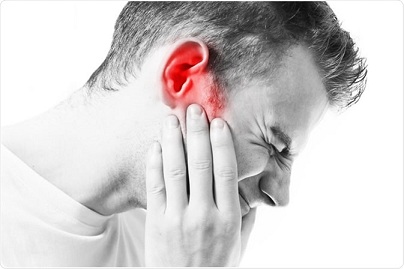COVID-19 Impacts: SARS-CoV-2 Exacerbates Pre-Existing Tinnitus And In Some Actually Causes It, Making It Another Possible “Long COVID” Symptom
Source: COVID-19 Impacts Nov 08, 2020 5 years, 1 month, 1 week, 3 days, 2 hours, 16 minutes ago
COVID-19 Impacts: Researchers from Anglia Ruskin University (ARU), with support from the British Tinnitus Association and the American Tinnitus Association have found in a new study that the common condition that causes the perception of noise in the ear and head known as tinnitus is actually exacerbated by COVID-19 and at the same time it was also found that some individuals who never had the condition before, developed it after contracting COVID-19 leading to assumptions that it could also be another long term health implication.

In brief, although the study was aimed at those with pre-existing tinnitus, 7 individuals reported having COVID-19 initiated tinnitus. Having COVID-19 symptoms exacerbated tinnitus in 40% of respondents, made no change in 54%, and improved tinnitus in 6%. Other mediating factors such as the social and emotional consequences of the pandemic made pre-existing tinnitus more bothersome for 32% of the respondents, particularly for females and younger adults, better for 1%, and caused no change to tinnitus for 67%. Pre-existing tinnitus was significantly exacerbated for those self-isolating, experiencing loneliness, sleeping poorly, and with reduced levels of exercise. Increased depression, anxiety, irritability, and financial worries further significantly contributed to tinnitus being more bothersome during the pandemic period.
The study findings were published in the peer reviewed journal: Frontiers in Public Health.
https://www.frontiersin.org/articles/10.3389/fpubh.2020.592878/full
The new study involved 3,103 people with tinnitus, with participants originating from 48 countries, with the vast majority coming from the UK and the US.
The study found that 40% of those displaying symptoms of COVID-19 simultaneously experience a worsening of their tinnitus.
Despite the study focusing on individuals with pre-existing tinnitus, a small number of participants also reported that their condition was initially triggered by developing COVID-19 symptoms, suggesting that tinnitus could be a ‘long COVID’ symptom in some cases.
It is estimated that tinnitus affects one in eight adults in the UK and is associated with reduced emotional wellbeing, depression, and anxiety.
The new study also found that a large proportion of individuals believe their tinnitus is being made worse by social distancing measures introduced to help control the spread of the virus. These measures have led to significant changes to work and lifestyle routines.
British respondents reported this to be a greater issue compared to individuals from other countries, with 46% of UK respondents saying that lifestyle changes had negatively impacted their tinnitus compared to 29% in North America.
It was found that internal worries such as fear of catching COVID-19, financial concerns, loneliness, and trouble sleeping have contributed to making tinnitus more bothersome for 32% of individuals overall, with external factors such as increased videocalls, noisier home environments, homeschooling, and increased coffee and alcohol consumption also cited by respondents. Females and the under-50s found tinnitus significantly more bothersome during the pandemic.
t;
The new research noted that as well as increasing the severity of tinnitus symptoms, the COVID-19 pandemic has also made it more difficult for people to access healthcare support for the condition. This could further increase emotional distress and worsen tinnitus symptoms, creating a vicious cycle. Before COVID-19, more than eight out of 10 UK patients were already unhappy with the treatment options available from their health professional.
Dr Eldre Beukes, lead author and a Research Fellow at Anglia Ruskin University (ARU) in Cambridge, England, and Lamar University in Texas told Thailand Medical News, “The study findings highlight the complexities associated with experiencing tinnitus and how both internal factors, such as increased anxiety and feelings of loneliness, and external factors, such as changes to daily routines, can have a significant effect on the condition.”
He further added, “Some of the changes brought about by COVID-19 appear to have had a negative impact on the lives of people with tinnitus and participants in this study reported that COVID-19 symptoms are worsening or, in some cases, even initiating tinnitus and hearing loss. This is something that needs to be closely examined by both clinical and support services.”
Chief Executive of the British Tinnitus Association and a co-author of the study, Dr David Stockdale, commented, “With the second wave of COVID-19 and the resulting national lockdown likely to increase feelings of stress and isolation, it’s vital that we don’t see the same mistakes as before when it comes to community health provision for people with tinnitus. Poor treatment of tinnitus in the early stages often leads to much worse cases and severe tinnitus can have a huge impact on mental health. With this in mind, as the COVID-19 second wave takes hold, the healthcare system needs to ensure that anyone who develops tinnitus or experiences a worsening of their condition can access the professional healthcare support they need as quickly as possible.”
The study team concluded, “These research findings have implications for tinnitus management, because they highlight the diverse response both internal and external factors have on tinnitus levels. Clinical services should be mindful that tinnitus may be caused by contracting COVID-19 and pre-existing tinnitus may be exacerbated, although in the majority of respondents there was no change. Additional support should be offered where tinnitus severity has increased due to the health, social, and/or emotional effects of the COVID-19 pandemic. Tinnitus may be more bothersome for those experiencing loneliness, having fewer social interactions, and who are more anxious or worried.”
For more on
COVID-19 Impacts, keep on logging to Thailand Medical News.
